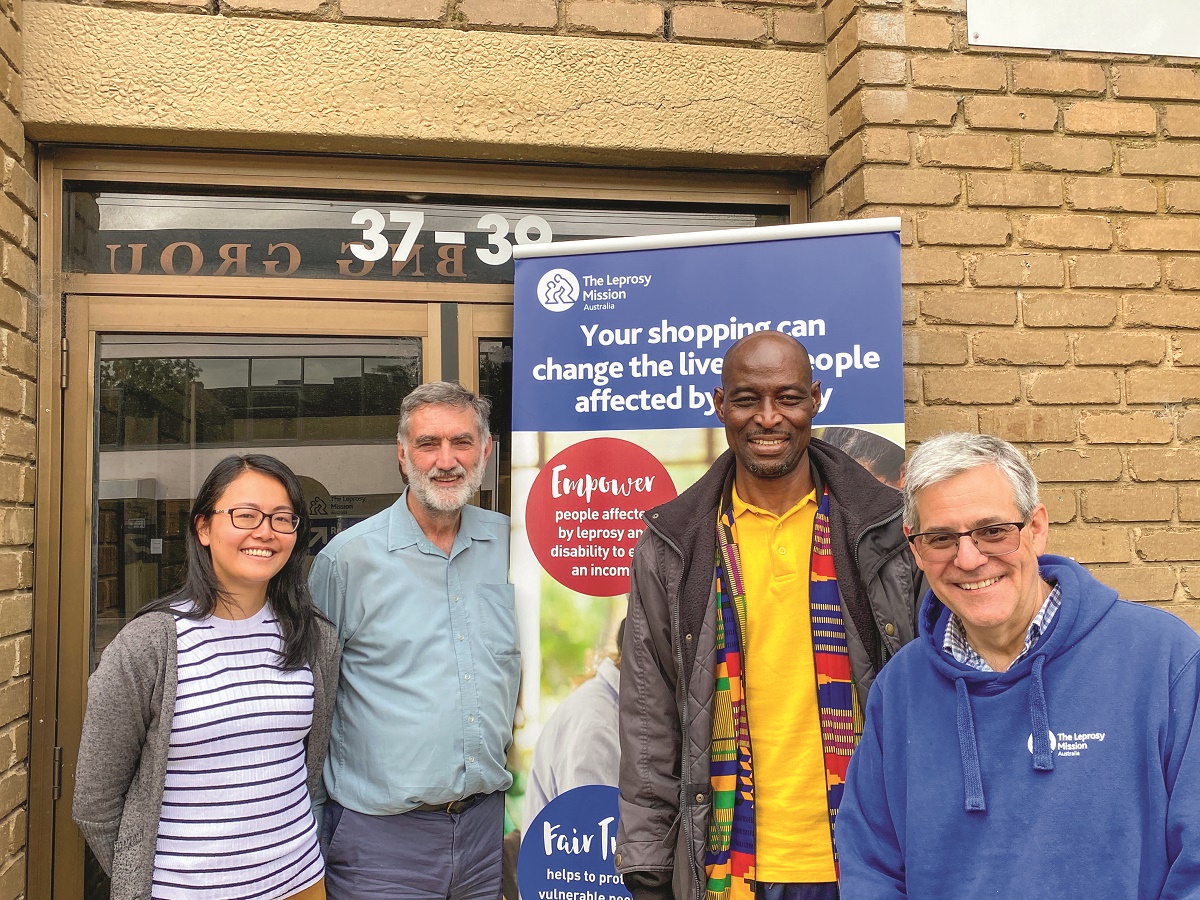By Andrew Newmarch and Andrew Humphries
Out she came, clothed completely in protective gear: goggles, mask, gloves, and disposable gown, just like during Covid-19.
But this time the enemy was leprosy, and the point of the illustration was that the protective gear was no longer needed.
As Eaglehawk Uniting Church lay preacher Merrill Cole explained traditional fears about leprosy and how they no longer needed to be feared, she took off the protective clothing.
Since the 1980s, a cocktail of antibiotics can now be taken by leprosy sufferers and, within 48 hours, they are no longer contagious.
Merrill has been to Nepal to see leprosy work and has been a long-term supporter of The Leprosy Mission Australia, as co-ordinator of Eaglehawk’s monthly FOCUS Service.
Her display came during a visit by Pius Ogbu Sunday, the programs and operations manager from The Leprosy Mission Nigeria.
Pius was in Australia as a guest of TLMA but also to participate in the Australian Council for International Development’s annual conference as guest speaker.
Merrill says it was a wonderful experience to host the visit from Pius.
“When I contacted The Leprosy Mission Australia to request a speaker for a FOCUS Service, I never expected to have the offer of an international speaker from Nigeria,” she says.
“And not just to speak, but to share his experiences with people diagnosed with leprosy, the difficulties with accessing treatment, and negotiating and influencing government processes to affect change to promote equality.
“Hearing from someone (like Pius) is much more compelling and ‘real’ than any amount of the same accounts that we see on TV or read about in a magazine or on social media.
“Thank you to Glenn Coleman and Andrew Newmarch from TLMA for their assistance in bringing Pius to Eaglehawk.”
Merrill says Eaglehawk has had a long-standing connection with TLMA as part of the congregation’s regular FOCUS Service theme promoting support for various organisations or programs.
“Our FOCUS services are currently the first Sunday of each month and there is a different Christian-based organisation or a UCA program that we bring to our congregation with updates, information, and an opportunity to contribute financially through donations,” she says.
Pius talked about change and the transformation that can come about for individuals and society as a result of the work on the ground by TLMN, but also the support from congregations and the public.
He told the story of Isiyaku, who was 47 when he finally presented to a clinic and was diagnosed with leprosy.
He had not had the opportunity or knowledge to get checked earlier and was suffering from ulcers and pain, which meant hospitalisation.

The Leprosy Mission Australia representatives Eva Lee, Andrew Newmarch and Paul Andrews with Pius Ogbu Sunday at TLMA’s Box Hill headquarters.
As he lay there and observed, Isiyaku realised that the people who consistently visited him and asked after him were leprosy mission people and local church members.
He was astonished and curious as he discovered that their motivation was the love of Jesus, a concept he had not heard about or understood before, and he decided that this was something he wanted more of.
He flouted the hospital rules and found his way to a nearby church on a Sunday and began to learn more and, when he was discharged, he talked about these new learnings with his family, who also became interested.
Sadly, Isiyaku died soon after from complications from his ulcers, but not before he had found joy in a new spiritual awakening.
Pius also told the Eaglehawk congregation about how serious change around leprosy had also taken place at a public level in Nigeria, a fact brought home by what he had observed at a referendum polling booth in Melbourne the day before.
“This could never happen in my country,” Pius told the congregation.
“Polling booths are vulnerable and volatile places, but you all just queue up calmly and even have barbecues to celebrate your vote.
“Here, you are all required to vote but that is not the case in my country; some are even excluded from voting.”
Pius went on to explain that two barriers exist for people with leprosy and disability wanting to vote in Nigeria.
People in Nigeria have to register to vote and get a voting card, but the first obstacle is that electoral commission staff are fearful of leprosy and won’t go near people with leprosy attempting to register or worse, will prevent them from coming to the registration centre.
Secondly, voter registration is by fingerprint and many people with leprosy do not have fingers, so they are effectively disenfranchised.
Pius explained how TLMN and disability organisations lobbied the electoral commission for change, offered to train staff and invited the Australian High Commissioner to launch the training.
This elicited a very positive response from the electoral commission but the rules still needed to change.
A group of people from the leprosy colony just outside the capital, Abuja, came and occupied the INEC offices, resulting in changes to the Electoral Act which then allowed for facial recognition as an alternative to fingerprints to get a voting card.
In elections in February this year, only about 25 per cent of the population registered to vote but about 50 per cent of the newly eligible population of people with leprosy and disability turned out.
Pius described the fight against leprosy as like the story of Moses and Joshua fighting the Amalekites as recorded in Exodus 17.
For Pius and other Leprosy Mission partners around the world, there is a deep sense of gratitude for the support and interest from the churches and public in Australia.
Andrew Newmarch is The Leprosy Mission Australia Head of International Programs

